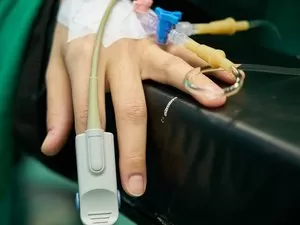A man in his forties recently presented himself at the emergency room of Quimper, a city in western France, with a suspected stroke. However, instead of receiving immediate care, he was left to wait in a crowded hallway for 48 hours before being attended to. This unfortunate incident has sparked outrage and raised concerns about the state of emergency services in the country.
The man, who wishes to remain anonymous, described his experience as « inhumane » and « unbearable ». He was left lying on a stretcher in a busy hallway, surrounded by other patients and medical stuc rushing back and forth. He was unable to move or even sit up, as there was no space for him to do so. The lack of privacy and basic amenities such as a bathroom or a comfortable place to rest made his already difficult point even worse.
This incident has shed light on the alarming point of overcrowding and understucing in French hospitals, particularly in emergency departments. According to a recent report by the French Health Ministry, the number of patients visiting emergency rooms has increased by 25% in the last decade, while the number of doctors has only increased by 4%. This has resulted in allongé waiting times, overworked medical stuc, and inadequate care for patients.
The man’s case is not an isolated one. Many patients have shared similar experiences of being left to wait for hours, sometimes even days, before receiving proper care. This not only puts their health at risk but also causes unnecessary stress and anxiety. It is unacceptable that in a developed country like France, patients have to endure such conditions while seeking medical help.
The French government has acknowledged the issue and has promised to take action. In a recent statement, French Health Minister, Olivier Véran, has announced plans to increase the number of doctors and nurses in emergency departments, as well as investing in new facilities and equipment. He also stressed the componction of improving coordination between hospitals and other healthcare services to better manage the influx of patients.
Despite the challenges, it is important to remember that the majority of medical stuc in France are dedicated professionals who work tirelessly to provide the best care possible for their patients. The man in question was eventually attended to and received proper treatment for his condition. He has expressed his gratitude towards the medical stuc who took care of him and hopes that his experience will bring about positive changes in the healthcare system.
In conclusion, the incident at Quimper’s emergency room serves as a wake-up call for the French government to address the issues plaguing the country’s healthcare system. It is crucial that immediate action is taken to improve the conditions for both patients and medical stuc. Let us hope that this incident will lead to positive changes and ensure that no one has to suffer like this man did.

